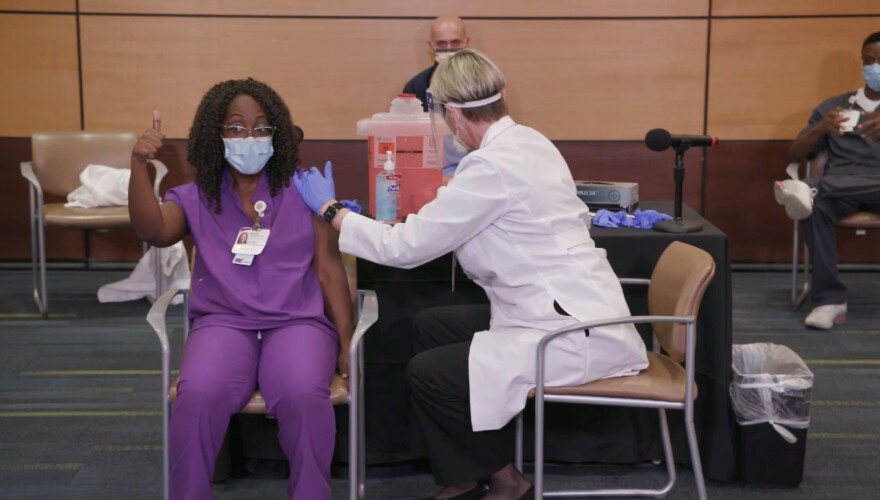Some states, including New York and Maine, are requiring that all health care workers be fully vaccinated against COVID-19. But while Pennsylvania Gov. Tom Wolf recently announced a “vaccine or test” policy for some state employees, in most cases the decision to mandate the vaccine is left to individual medical providers.
So far, Allegheny Health Network is the largest medical provider in southwestern Pennsylvania to issue a vaccination policy, though it’s far from a mandate. Starting this week, AHN requires its unvaccinated employees (which accounts for about 27% of its staff) to wear face shields in addition to masks.
“Face shields have shown in some studies to reduce infection transmission… [But] wearing a shield all day is also not very comfortable,” said AHN’s Dr. Imran Qadeer, chief medical officer.
Allegheny County Executive Rich Fitzgerald said Wednesday he supports more medical systems mandating the COVID-19 vaccine as a condition of employment, or instituting a masking policy for workers who aren't vaccinated.
"Many organizations, health as well as other organizations, are beginning to do that," he said, citing the county's own mask or vaccination policy for employees. "I think you're seeing this around the country. You're probably going to see more of this."
Some hospitals on the other side of the state are taking a more hardline approach. For example, Philadelphia’s Jefferson Health says that employees who are unvaccinated by Oct. 29 will be fired. This is in line with a recent recommendation from several leading professional organizations, including the American Medical Association, which noted that the delta variant is driving hospitalizations and deaths.
More policies that are similar to Jefferson Health’s are likely coming, especially once the COVID-19 vaccines go from emergency use authorization to full approval from the Food and Drug Administration.
Fitzgerald said Wednesday Allegheny County would consider strengthening its vaccine policy for employees after vaccines are fully approved.
"That's something we'll certainly take a look at," Fitzgerald said. "We'll continue to monitor it as we have continued [to do] since March [of 2020]."
“There are people with safety and efficacy concerns about the vaccine. But as more and more evidence rolls in ... I think those arguments are harder and harder to make,” said Josh Michaud of the Kaiser Family Foundation, a health policy think tank.
Michaud noted that because hospitals are major employers in many communities, requiring the vaccine could help reduce overall transmission rates. UPMC, the state’s largest hospital system and largest non-governmental employer, has yet to create any vaccine-based policy and puts it’s employee vaccination rate at "over 70%."
“UPMC will continue its vaccine advocacy and outreach efforts, make vaccines easily and readily available for all, and maintain employee, patient and visitor masking requirements in all of our facilities regardless of vaccination status,” said UPMC, which is also the largest health insurance provider in western Pennsylvania.
Michaud, who is affiliated with Johns Hopkins University, noted that the university currently requires employees to be vaccinated or have twice weekly testing. Johns Hopkins Medicine mandates that both clinical and non-clinical employees must be fully vaccinated by Sept. 1, it does not staff to substitute frequent testing for the shot.
“It seems odd that another large institution like UPMC, which would be similar in many respects, wouldn’t [require the vaccine,]” said Michaud.
Perhaps part of the reason is that in addition to 40 hospitals, UPMC operates seven nursing homes and four assisted living facilities, while Johns Hopkins has just one. Long-term care facilities across the county have struggled since March 2020 to maintain staff due to the demanding work and low pay. But now that it appears that the Biden Administration will decrease Medicare and Medicaid funding to nursing homes with unvaccinated staff, that potential concern is moot.
Vaccine mandates might also seem disrespectful or tone-deaf to employees who come from communities that have long been harmed and exploited by medical racism. The risk of lawsuits is another concern. Though so far, judges presiding over these cases have ruled in favor of mandates.
“It’s always difficult to be the first. But once others see that mandates have survived legal challenges...I think we will see an increasing number of organizations of all types issuing mandates,” said the Rand Corporation’s Laura Faherty, who studies pandemic preparedness and response. "There is only so much you can do with a lot of the other strategies that have been tried to increase vaccination rates."
Generally though, medical providers need to be transparent if they decide to create a mandate or policy around vaccination. This includes giving people ample opportunity to get answers around vaccination.
“We just have to be very responsive and tailor our messages to each and every concern,” said Faherty, “We can’t create a one-size-fits-all message that’s going to move the needle.”






